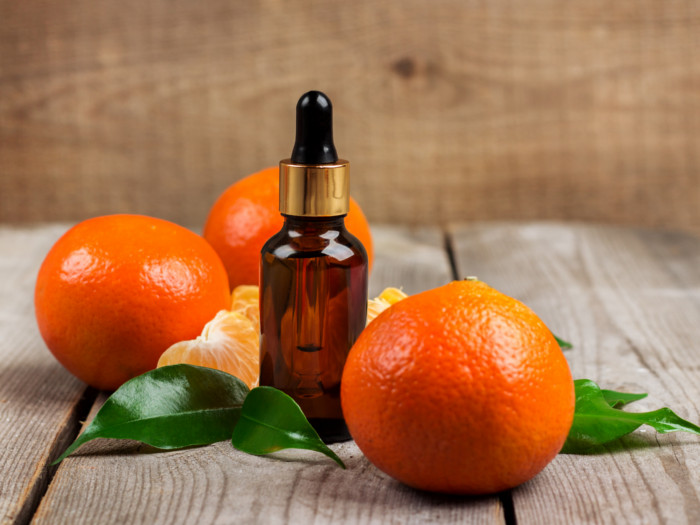The health benefits of Tangerine essential oil can be attributed to its potential properties as an antiseptic, antispasmodic, cytophylactic, depurative, sedative, stomachic, and a tonic substance.
This is yet another essential oil from a citrus fruit. You might be familiar with “tangerines”, and when you study about essential oils of mandarin oranges, you will find that tangerines are almost identical to mandarin oranges, with the exception that they have a deeper orange color, lack pips, and are harvested in a different time of the year than mandarin oranges.
Even the botanical name for tangerines and mandarin oranges is the same. Botanically, they are both known as Citrus reticulata. They are native to China, and from there, they have spread to other parts of the world. Just like mandarin orange essential oil, the essential oil of tangerine is extracted by cold compression of its peels and contains alpha pinene, alpha-thujone, beta pinene, camphene, citronellal, gamma terpinolene, geranial, limonene, linalool, myrcene, nerol, sabinene, and terpineol as its chief components.
Health Benefits of Tangerine Essential Oil
Like mandarins, tangerines also hold a place of significance in Chinese culture and herbal medicines. These medicinal properties are explained in greater detail below.
May Prevent Sepsis
Staphylococcus Aureus is the species of bacteria that is responsible for this dreaded infection called sepsis. Sepsis is a really bad condition. It is not only limited to mere swelling and reddening of wounds, but also with acute pain. If not curbed, it can quickly spread to the other parts of the body and affect them, even if there are no wounds there. It causes acute pain, immobility, and hardening of joints, as well as acute contraction and cramps in muscles, swelling, redness, fever, and convulsions. It also readily attacks newborn babies, since their skin is vulnerable to infections. It also attacks them when they are separated from their mother’s body by cutting the umbilical cord. The essential oil of tangerine contains certain components which may kill these bacteria and stop it from spreading, thereby helping to cure sepsis. It can be externally applied to open wounds, as well as taken orally to create a uniform effect on the whole body.

Tangerine oil contains antioxidants and is used in a variety of recipes for its flavour. Photo Credit: Shutterstock
May Act as a Cytophylactic
Certain components of this oil stimulate the generation of new cells or more precisely, cell division, and recycling of the cellular material in the body. This does not only promote general growth within the body but also helps to heal or repair the regular wear and tear and outstanding damage done to the body.
Might Purify Blood
An agent that purifies the blood is called a depurative. Tangerine essential oil is considered a powerful depurative. It may help in the excretion or removal of toxic and unwanted substances such as uric acid, pollutants, extra salt, and water from the body through sweat, urine, and the excretory process. It increases the oxygen-retaining capacity of the erythrocytes (red blood cells), thereby refreshing and purifying the blood.
May Soothe Inflammation
The essential oil of tangerine soothes the body. It soothes all types of inflammation and hyperactivity in the organ systems functioning in the body, namely the respiratory, circulatory, digestive, nervous, and excretory systems. It sedates inflammation from fever, the intrusion of poisonous substances in the bloodstream from external sources, convulsions, anxiety, stress, and hypersensitivity to allergies. It also sedates depression, anger, and impulsive responses.
Might Boost Digestion
As a stomachic, the essential oil of tangerine keeps your stomach in a good condition by maintaining a proper flow of digestive juices and maintains the right balance between the acid and bile so that excess acids are neutralized. This may also cure wounds, if any, in the stomach. It soothes the stomach and gives relief from inflammation. One thing must be understood; if someone wants to have a healthy and attractive physique, then he must keep his stomach finely tuned, precisely what this oil does.
May Relieve Spasms
Spasms may be a small word but the effects may be widespread and highly dangerous. Spasms are not restricted to muscular cramps only. They can happen in the respiratory, digestive, and nervous systems and can cause breathing troubles, asthma, congestion, severe coughs, spasmodic diarrhea, cholera, nervous afflictions, and convulsions. The essential oil of tangerine may induce relaxations in the organ systems named above and gives relief from spasms.
Might Act as a Tonic
An agent that tones and fortifies is a tonic and tangerine essential oil has this property. It may tone up all the functions in the body. It fine-tunes metabolic functions such as decomposition of food and absorption of nutrients by toning up the liver, stomach, and intestines. It also helps in growth and adds to strength; ensures proper excretion; promotes secretions of the endocrine system and also tones up the nervous system to keep you alert and active. Finally, it boosts the immune system to protect you from infections. When your body is tuned and toned up, it will give your body more mileage and make you function healthier and happier over the long term.
Other Benefits
Tangerine essential oil may improve circulation of blood and phlegm, boost digestion, help to maintain oil and moisture balance in the skin, and shows cicatrizant and emollient properties as well. It may also ease constipation and treats diarrhea, flatulence, rashes, dryness, and cracking of skin, hair problems, and dandruff.
Word of Caution: This oil may show some extent of phototoxicity in certain skin types, but in general, it is non-toxic, non-irritating, and non-sensitizing.
Blending: The essential oil of tangerine blends very well with the essential oils of bergamot, cinnamon, clary sage, clove, frankincense, lavender, nutmeg, and neroli.
